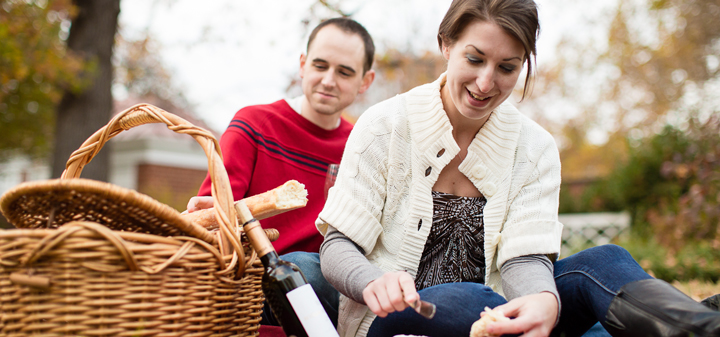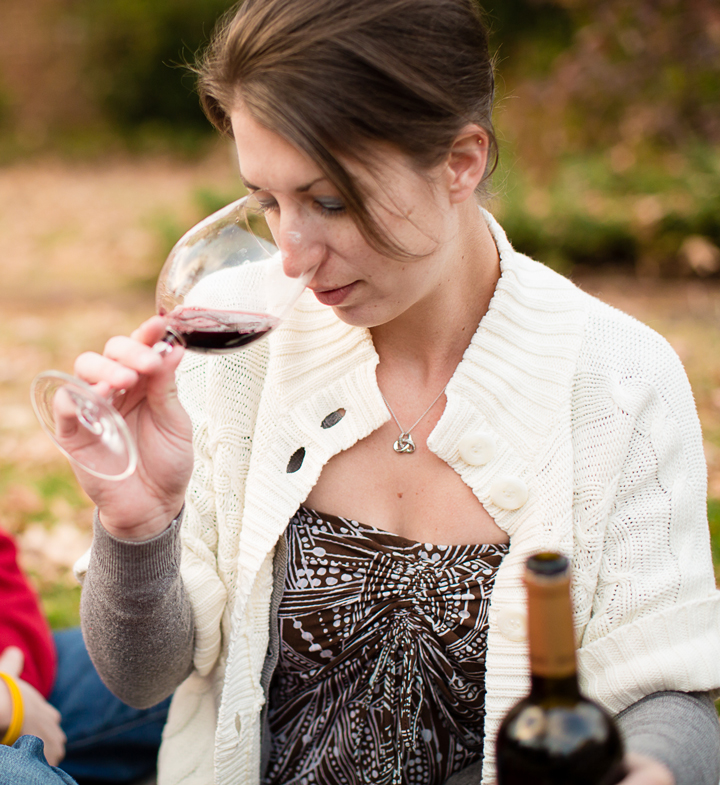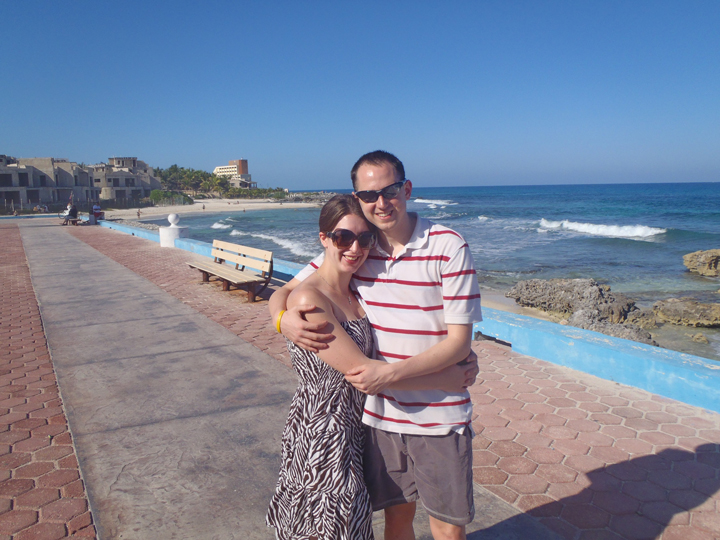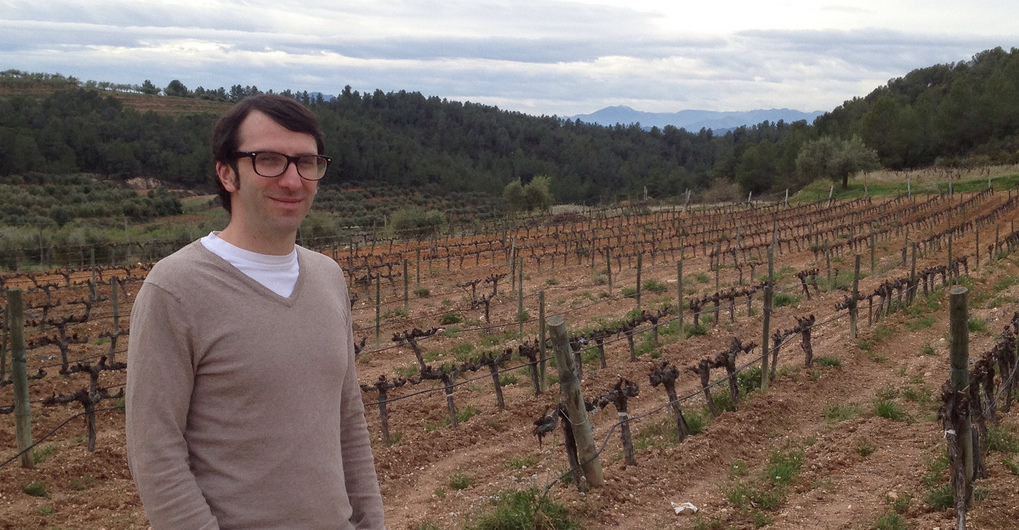
Becca Yeamans is admittedly no sommelier, winemaker, or vineyard management expert — but, quite frankly, that doesn't matter. The Academic Wino's strong thirst for knowledge has her dissecting the current landscape for research in enology and viticulture. Her curiosity and subsequent research into wine has, in turn, provided fascinating insights that span nearly every aspect of academia, including personal health along with the social and psychological effects. The Charlottesville local isn't necessarily "uneducated" in wine, either. Becca has worked extensively at a couple tasting rooms around Virginia. And don't think that a relevant, more formal education in academia has altogether eluded her: she is the holder of a bachelor's degree in biology, a master's degree in environmental sciences, and has taken college courses in both enology and viticulture. So for this week's SpeakEasy, I caught up with Becca about her blog's third anniversary, the craziest tasting room stories, and how she is continually inspired by her fiancé.
Jameson Fink: Your blog just celebrated it’s 3rd anniversary. Looking back, where did you think you’d be at the three year mark and what things along the way have surprised you the most?
Becca Yeamans: To be completely honest, looking back I really had no clue my blog would even make it to the three year mark! I suppose I hoped that it would be successful and take off, but I had been advised ahead of time to expect failure, since a lot of blogs don’t really pan out. However, always the eternal optimist (well, realist with an optimistic slant), I knew that regardless of how many visitors or followers I had, I would still maintain a sense of consistency and effort as I was and continue to be very fascinated about the science of wine, and how we treat the land and how we make the wine is inherently connected to our lives whether we see it or not. That consistency and dedication seems to be working pretty well for me three years later (and going strong!).
[THE TIPPLER TEN: BECCA YEAMAN'S CHARLOTTESVILLE]
In terms of surprises, well, to be where I am now after only a short three years still catches me off guard every so often. I never expected to make so many connections and new friendships throughout this journey, and to be able to engage so many people in discussions about the varying aspects of wine science.The recognition I’ve received from other wine writers and industry professionals also has me very humbled and surprised.
How did working in tasting rooms shape your appreciation of wine? What did people who came in the tasting room want to know about wine? Were they full of questions? Nervous? Knowledgeable? Any crazy tasting room stories?
Working in the tasting rooms was actually one of my main drivers for my developing appreciation of wine at the time. I had moved to Charlottesville after being accepted into the Environmental Sciences graduate program at the University of Virginia, and it just so happened that Virginia and the Charlottesville region in general (Monticello AVA) was an up and coming wine powerhouse in the US. I was interested in doing a little part time work, since grad students get paid so much (*cough*, *cough*), and happened to notice that several of the wineries in the area were looking for pourers in the tasting rooms.
 I ended up starting my career working in tasting rooms at the smallest winery in the Monticello AVA, Flying Fox Vineyard, which is owned by an amazing and highly intelligent couple (Lynn Davis and Rich Evans) through whom I was able to absorb seemingly inordinate amounts of information. They helped shape my initial backbone knowledge of wine, and with my insatiable desire to learn and my strong background in environmental science/ecology and chemistry, I quickly became addicted to the science of wine and viticulture.
I ended up starting my career working in tasting rooms at the smallest winery in the Monticello AVA, Flying Fox Vineyard, which is owned by an amazing and highly intelligent couple (Lynn Davis and Rich Evans) through whom I was able to absorb seemingly inordinate amounts of information. They helped shape my initial backbone knowledge of wine, and with my insatiable desire to learn and my strong background in environmental science/ecology and chemistry, I quickly became addicted to the science of wine and viticulture.
In regards to the people that came into the tasting room, there was quite a wide variety of folks. Most people were very nice (drinking wine makes most people very happy!) and had a lot of the same questions: history of the winery/vineyard; difference between stainless steel and oaked Chardonnay’s; general questions about the grape growing or winemaking processes. Most people were just happy to get a little bit of information related to the wine that they were drinking (be it a story or something scientific).
Often, I would come across people who would in one way or another tell me that they were embarrassed that they enjoyed sweeter wines, which is a feeling that has sadly been impressed upon people by the “powers that be” for reasons that are not completely logical to me. I then educated the guests a bit on the physiological differences between individual tasters, and how that it is, in fact very acceptable to drink what you like and not feel ashamed about it. Just remember you sweet wine lovers, you have significantly more taste buds on your tongue than your super-dry-wine-only drinking friend over there, so instead of apologizing for what you like, brag about what you’ve got! (For the record: I enjoy ALL kinds of wine, from the sweetest of sweet to the driest of dry).
As far as “crazy tasting room stories” go, I won’t go into much detail in order to protect the (not so) innocent, but based on certain things I’ve seen, I would advise winery tasting room patrons to always be respectable of all those around you. You’re not the only people in the tasting room, and I don’t think that sweet little couple over there in the corner really needs to hear you guffawing on and on about the wild and crazy party you attended from which you are still hung over. Unless you’re paying for a private tasting, try to use your “inside voice” and be respectful of the tasting room rules. Don’t get upset when our tasting room has a slightly different policy than the winery you just visited. Most likely than not, the person you are yelling at behind the bar had nothing to do with those policies.
What do you think are the most interesting, and most contentious, issues concerning wine and science, whether dealing with vineyards, production, or consumption?
That’s a really great question. Right now, I think the biggest issue concerning wine and science is related to climate change. Regardless of what you think is the primary driver for climate change, I think nearly everyone can agree that it IS changing. A LOT of wheels are turning at different rates and in different directions, and it’s not completely clear what is to be expected at the individual winery/vineyard level. There are maps forecasting general trends of where it’ll be warmer, where it’ll be drier, where it will be wetter, etc, though the solution or solutions to adjusting to this change has yet to be fully realized.
Stemming from this, the issue of increasing biodiversity of wine grapes is extremely important. As global climate continues to change, some grape cultivars will probably not survive or the areas where these varieties can grow will change. Developing more genetically diverse cultivars from the current stock will allow the industry to have a better chance at success in an uncertain future. We are already seeing some progress in this area in different parts of the world, though much more needs to be done. We have to continue to embrace the idea of biodiversity and different varieties of wine grapes, and accept the fact that change IS necessary and continuing down the path of “tradition”, we’ll just end up with nothing. For the consumers, let’s start by purchasing more “unknown” types of wine instead of our “old standbys”. Let’s create the demand for biodiversity by seeking out and purchasing those wines made from grapes you’ve never heard of
NOTE: Biodiversity is important for a whole slew of other reasons, not just wine, but that’s a whole other discussion!
We met at the Wine Bloggers Conference in Portland and I see you are registered for this year’s in Santa Barbara. What are the highlights of these conferences and what do you hope to get out of attending?
The highlights of these conferences, for me, is getting a chance to interact and learn from many other wine bloggers, and to develop cooperative relationships with them in order to improve the field and overall reputation of wine blogging, as well as learning how to be a more well-rounded blogger myself. I also love the more technical/nerdy presentations during the conference, as these sessions often provide the solid backbone for understanding why the wine of a certain area is the way it. Getting to taste the wines from a particular region is more of a bonus, in my opinion!
Speaking of meeting at WBC, we sat at the same table at a pretty amazing dinner at Phelps Creek in the Columbia Gorge. Was that a wine area you were familiar with prior and did it surprise you to see a bit of the Oregon wine world beyond the Willamette Valley?
That was a pretty spectacular dinner, wasn’t it? I’m drooling a little just reminiscing about it!
Actually, at that time in the development of my wine knowledge and experience, I had very little if any experience with wines from the Columbia Gorge. There are so many different types of wine from different places, I suppose by the time I got to WBC12, I hadn’t yet reached the Columbia Gorge region on the wine store shelf! I felt as though many of the wines were very well done, and were definitely wines that I would want to seek out again in the future. In general though, I love checking out regions that aren’t the most known in an area. You can be pleasantly surprised by these lesser known wine regions, which is something I’ve discovered both in the Columbia Gorge in Oregon, and then a year later in the Okanagan (British Columbia).
Finally, who influenced you to start writing about wine and who continues to do so?
I was inspired to start blogging in general thanks to my fiancé, who runs his own successful personal finance blog (www.mypersonalfinancejourney.com). I was really fascinated about the whole idea of blogging, and he helped educate me all about the craft. My strong admiration for science, education, and a developing interest in the science of wine led to my idea of marrying the disciplines together in blog form. This way, I could further educate not only myself, but others who are genuinely interested in the art and science of all things related to wine, and how it relates to the environment and public health.
I maintain my interest to write about wine partly as a result of my insatiable desire to learn, and partly as a result of my dedication to satisfying the educational needs and desires of my readers. There isn’t one person in particular that inspires me to keep going, but really the many who find interest and entertainment in my blog. By continuing to blog and build the personal connections that I have through events like the Wine Bloggers Conference, I continue gain an even greater appreciation for wine. If it wasn’t for wine, I wouldn’t be making these new lifelong friends and establishing these common bonds of knowledge and promotion of a sustainable world where all are equal, happy, and maybe just a little tipsy.











